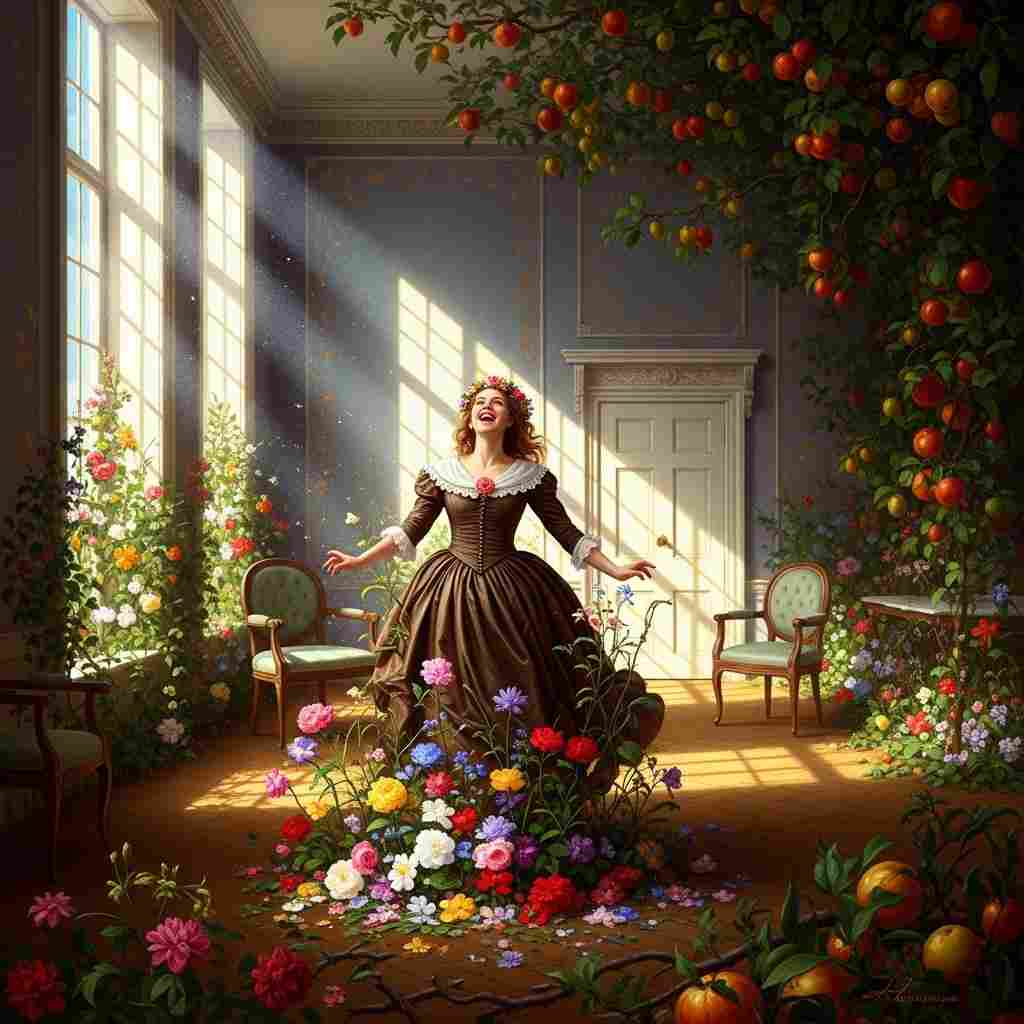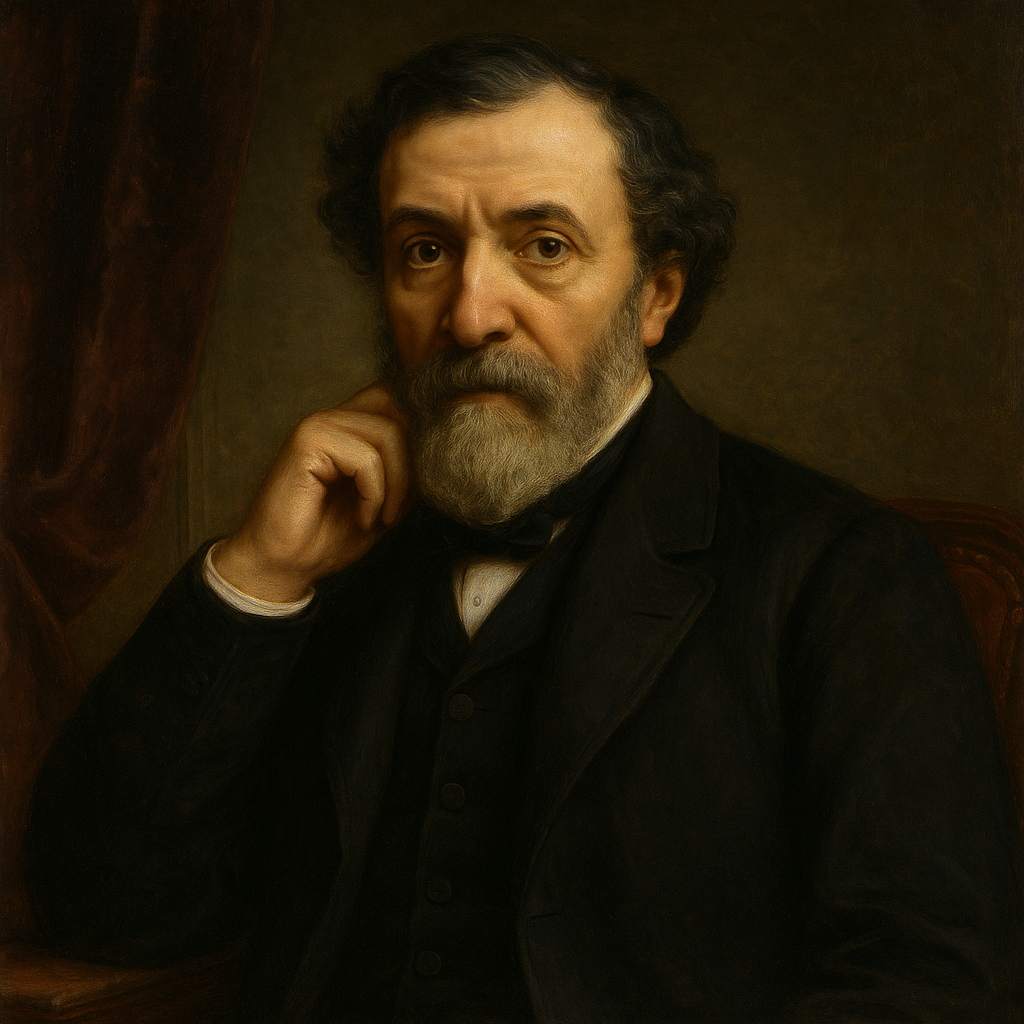Natural Magic
Robert Browning
1812 to 1889

All I can say is—I saw it!
The room was as bare as your hand.
I locked in the swarth little lady,—I swear,
From the head to the foot of her—well, quite as bare!
"No Nautch shall cheat me," said I, "taking my stand
At this bolt which I draw!" And this bolt—I withdraw it,
And there laughs the lady, not bare, but embowered
With—who knows what verdure, o'erfruited, o'erflowered?
Impossible! Only—I saw it!
All I can sing is—I feel it!
This life was as blank as that room;
I let you pass in here. Precaution, indeed?
Walls, ceiling, and floor,—not a chance for a weed!
Wide opens the entrance: where's cold, now, where's gloom?
No May to sow seed here, no June to reveal it,
Behold you enshrined in these blooms of your bringing,
These fruits of your bearing—nay, birds of your winging!
A fairy-tale! Only—I feel it!
Robert Browning's Natural Magic
Robert Browning’s Natural Magic is a compact yet richly evocative poem that explores themes of perception, transformation, and the sublime power of the imagination. Through its vivid imagery and paradoxical structure, the poem interrogates the boundaries between reality and illusion, the mundane and the magical. While brief, the poem’s layered meanings invite deep analysis, particularly in relation to Browning’s broader oeuvre, Victorian cultural anxieties, and Romantic influences. This essay will examine the poem’s historical and cultural context, its use of literary devices, its central themes, and its emotional resonance, with occasional comparative analysis to illuminate its significance.
Historical and Cultural Context
To fully appreciate Natural Magic, one must situate it within the Victorian era’s fascination with the supernatural, the exotic, and the limits of empirical observation. The 19th century was a period of rapid scientific advancement, with Darwinian theory, industrial progress, and secularization challenging traditional religious and mystical worldviews. Yet, simultaneously, there was a resurgence of interest in spiritualism, mesmerism, and Orientalist fantasies—what Browning himself might have termed "natural magic."
The reference to the "Nautch" (a term for Indian dancing girls performing in British colonial contexts) suggests an engagement with Orientalist tropes, wherein the East was often depicted as a site of sensuality, deception, and mysticism. The speaker’s initial skepticism—"No Nautch shall cheat me"—reflects a Western rationalist distrust of perceived exotic trickery. Yet the poem ultimately subverts this skepticism, embracing instead a transformative vision that transcends empirical doubt.
Browning’s personal interest in dramatic monologues and psychological complexity also informs the poem. Unlike his longer, more narrative-driven works (My Last Duchess, The Bishop Orders His Tomb), Natural Magic is a distilled moment of revelation, akin to the epiphanic flashes in Romantic poetry. The poem’s brevity and intensity align it with the tradition of the lyric fragment, where meaning is condensed into a single, luminous impression.
Literary Devices and Structure
The poem consists of two stanzas, each following a parallel structure that moves from skepticism to wonder. The repetition of "All I can say/sing is—I saw/felt it!" underscores the limitations of language in capturing transcendent experience, a theme Browning revisits in poems like Fra Lippo Lippi ("This world’s no blot for us / Nor blank; it means intensely, and means good").
1. Imagery and Symbolism
The central contrast between barrenness and fertility drives the poem’s imagery. The initial description of the room as "bare as your hand" suggests sterility, a void devoid of life. The "swarth little lady" (a phrase evoking darkness and exoticism) appears equally unadorned—"from the head to the foot of her—well, quite as bare!" Yet, in an instant, she is "embowered / With—who knows what verdure, o’erfruited, o’erflowered?" This sudden eruption of natural abundance defies logic, positioning the scene as a moment of mystical revelation.
The second stanza extends this imagery into metaphor: the speaker’s life, once "blank as that room," is now filled with "blooms," "fruits," and "birds" brought forth by an unnamed "you." The shift from emptiness to plenitude mirrors Romantic conceptions of the imagination’s generative power—akin to Coleridge’s "esemplastic" faculty in Biographia Literaria, which shapes perception into art.
2. Paradox and Irony
The poem hinges on paradox: the bare becomes lush; the impossible becomes real. The speaker’s insistence on empirical certainty ("I locked her in," "this bolt which I draw") is overturned by the inexplicable transformation. The phrase "Impossible! Only—I saw it!" encapsulates this tension—reason denies what the senses affirm. Browning often employs such irony to critique rigid rationality, as in Caliban Upon Setebos, where primitive superstition and modern skepticism are ironically juxtaposed.
3. Enjambment and Rhythm
Though this analysis avoids discussing rhyme, Browning’s use of enjambment creates a breathless, almost incantatory rhythm, mimicking the speaker’s astonishment. Lines spill into one another ("embowered / With—who knows what verdure"), reinforcing the sense of overflowing abundance. The dashes and exclamations ("Impossible! Only—I saw it!") further heighten the emotional immediacy.
Themes
1. Perception vs. Reality
The poem interrogates the reliability of perception. The speaker begins in a stance of control ("No Nautch shall cheat me") but is ultimately overwhelmed by a vision that defies explanation. This aligns with Browning’s frequent exploration of subjective experience—consider Porphyria’s Lover, where the speaker’s delusion reshapes reality. Here, however, the transformation is not sinister but ecstatic, suggesting that wonder exists beyond rational comprehension.
2. The Transformative Power of Love/Art
The second stanza shifts from a literal scene to a metaphorical one: the "you" who enters the speaker’s life brings forth blossoms, fruits, and birds—symbols of creativity, passion, and vitality. This mirrors Romantic and Victorian conflations of erotic and artistic inspiration (cf. Elizabeth Barrett Browning’s Sonnets from the Portuguese). The poem suggests that love, like magic, transfigures barrenness into beauty.
3. The Limits of Language
The refrain "All I can say/sing is—I saw/felt it!" acknowledges the inadequacy of words to convey profound experience. Browning, like the Romantics before him, grapples with the ineffable—what Keats called "the truth of imagination." The poem itself becomes an act of testimony, a fragile attempt to capture the uncapturable.
Emotional Impact and Philosophical Underpinnings
The poem’s emotional core lies in its movement from doubt to awe. The speaker’s initial defensiveness ("I locked her in") gives way to astonished surrender. This trajectory mirrors the Kantian sublime, where the mind confronts something so vast or inexplicable that it transcends understanding, evoking both terror and exhilaration.
Philosophically, the poem resonates with Schopenhauer’s idea of the world as Will and Representation: what we perceive as reality is merely surface, beneath which lies an ineffable, dynamic force. The lady’s transformation embodies this hidden vitality, bursting through the "bare" facade of empirical reality.
Comparative Analysis
Browning’s poem invites comparison with other Victorian works that blur reality and enchantment:
-
Tennyson’s The Lady of Shalott: Both poems feature enigmatic women who defy rational understanding, though Tennyson’s lady is tragic where Browning’s is jubilant.
-
Christina Rossetti’s Goblin Market: Like Natural Magic, Rossetti’s poem uses lush, almost hallucinatory imagery to explore temptation and transcendence.
-
Keats’ La Belle Dame sans Merci: Both poems depict a mesmerizing feminine figure who disrupts the speaker’s reality, though Keats’ tone is more ominous.
Conclusion
Natural Magic is a masterful miniature, encapsulating Browning’s preoccupation with the unseen forces that animate human experience. Through its rich imagery, paradoxical structure, and emotional immediacy, the poem celebrates the transformative power of the irrational—whether love, art, or sheer wonder. In an age of industrial progress and scientific certainty, Browning reminds us that magic persists, not as deception, but as a deeper truth beyond the grasp of reason. The poem’s final exclamation—"A fairy-tale! Only—I feel it!"—is both a confession and a triumph, affirming that the most profound realities are those we cannot prove, only perceive.
In this way, Natural Magic stands as a testament to poetry’s unique ability to straddle the seen and the unseen, the said and the unsayable. It is a fleeting glimpse of the sublime, captured in Browning’s inimitable voice—a voice that continues to resonate with readers who, like the speaker, find themselves astonished by the world’s hidden wonders.
This text was generated by AI and is for reference only. Learn more
Want to join the discussion? Reopen or create a unique username to comment. No personal details required!



Comments
No comments yet. Be the first to comment!